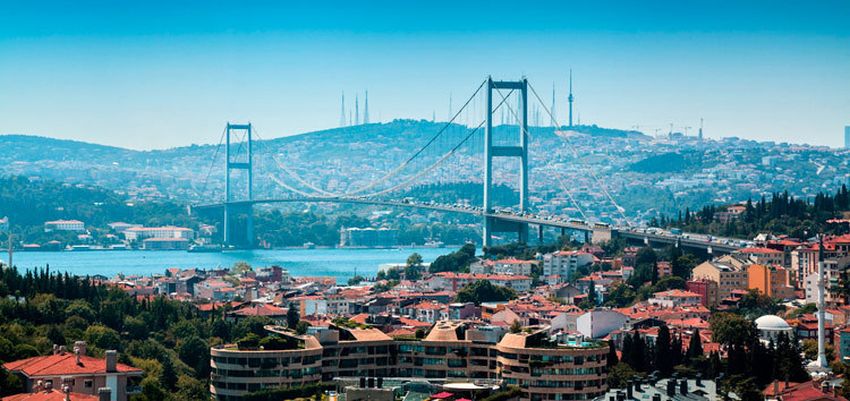- Record EBRD investment in the Turkish economy in a challenging 2021
- Green finance was in the spotlight as Turkey ratified the Paris Agreement
- Economic empowerment of women a focus of almost half of Bank projects last year
The European Bank for Reconstruction and Development (EBRD) stepped up its investment in Turkey to a record €2 billion in 2021, supporting the private sector’s recovery from Covid-19 and the country’s shift to “green”. More than 85 per cent of the Bank’s financing was channelled to the private sector and 55 per cent was dedicated to projects supporting sustainability.
As well as arranging its own financing, the EBRD mobilised an almost record-level of €572 million from other sources in 2021.
Arvid Tuerkner, EBRD Managing Director for Turkey, said: “While the Covid-19 pandemic is not subsiding and lira volatility is impacting the private sector’s ability to recover, the EBRD’s financing for the economy is more important than ever. In challenging times our focus is on safeguarding economic development gains and creating opportunities for Turkey’s green and inclusive economic recovery from the pandemic.”
He added that Turkey’s ratification of the Paris Agreement would pave the way for more green investment by the EBRD and other investors.
Sustainability in focus
Last year, as more and more governments moved to decarbonise the automotive industry, the EBRD supported Turkey in becoming a European hub for commercial electric vehicle (EV) production. The Bank arranged a €650 million syndicated loan to Ford Otosan, a joint venture between US automaker Ford and Turkey’s Koc Holding, to finance the production of a range of next-generation, all-electric and plug-in hybrid variants of one-tonne commercial vehicles for the European market.
The EBRD also extended a €150 million loan to Turkey’s leading household appliance manufacturer, Arçelik, to support a three-year environmentally sustainable investment programme. A tranche of the loan was structured in line with the Green Loan Principles of the Loan Market Association and is the first externally verified green loan to Turkish manufacturing.
Reconfirming its role as a key provider of renewable energy finance, the Bank invested in a green bond by Aydem Renewables and extended a loan to Borusan EnBW Enerji, a Turkish-German venture focused on renewables. With the EBRD’s help, Borusan is set to design and deploy one of the country’s first utility-scale battery storage units integrated into a renewable energy power plant.
Furthermore, a new EBRD loan was provided to the leading utility Enerjisa Enerji to finance a comprehensive investment plan for 2021-25. It includes the introduction of smart metering and smart grid systems, digitalisation of the network, improvements to the reliability of power supply, integration of renewables, and environmental, health and safety measures.
In the banking sector, where the EBRD channelled €826 million through the Trade Facilitation Programme and credit lines to nine banks and leasing companies, 36 per cent of financing was dedicated to green projects.
The Bank also boosted financing for leasing companies to a record €87 million, which will be used for green technology investments by the private sector.
In addition, the EBRD’s Board of Directors approved an innovative €500 million Green Economy Financing Facility, from which funds will be on-lent by financial institutions to firms investing in sustainability upgrades. The first investment under the framework will be made in the first quarter of 2022.
Public green agenda
Sustainability was also the focus of the Bank’s investments in the public sector.
The EBRD’s €150 million financing for the Ispartakule-Cerkezkoy railway line will help connect Turkey to the Trans-European Transport Network via Bulgaria and contribute to the reform of the railways, creating opportunities for the private sector. In addition, the expansion of the railway infrastructure will further support Turkey’s transition to a low-carbon economy.
The Bank also financed the new Buca metro line in Izmir and the acquisition of modern and cleaner buses in Mersin. In Gaziantep, it provided a loan for the construction of five grid-connected solar photovoltaic plants to support the city’s ambition to power most of its municipal buildings with solar energy.
Istanbul and Gaziantep decided to accelerate their investment in green solutions by joining EBRD Green Cities, a flagship urban sustainability programme, following the examples of Izmir and Ankara.
The EBRD also promoted private-sector know-how in waste management by investing in a minority stake in the leading waste-to-energy firm, Biotrend Çevre ve Enerji Yatırımları, active in nine cities across Turkey.
Equality of opportunity
Recognising the importance of fast-growing small and medium-sized enterprises for the Turkish economy, the EBRD supported more than 100 such businesses, through advisory services and financing, particularly through risk-sharing partnerships with local lenders TSKB, Garanti and Akbank. Main demand was in areas such as sustainable and resilient supply chains, accelerating digitalisation, and growing high-potential start-ups and women-led businesses.
The Covid-19 pandemic has highlighted inequalities, with lockdowns entrenching gender roles and reversing progress towards equality. Against this backdrop, the EBRD increased its efforts to promote equality of opportunity and the economic empowerment of women.
The Bank injected new impetus into its flagship Women in Business programme by making €600 million available to thousands of women-run businesses through Turkish banks. A total of €115 million has already been provided to Denizbank, Akbank and Yapi Kredi under the programme.
The EBRD also worked with private companies, helping to create conditions in which female employees could thrive and grow. Enerjisa Enerji, for example, is joining forces with the education authorities to encourage more women to pursue technical and vocational education.
Twenty of the EBRD’s 42 projects in Turkey in 2021 had a gender focus.
Together with state institutions, development banks, business associations and professional women’s networks, the Bank developed a roadmap that set out actions to promote greater representation of women in corporate decision-making. It also teamed up with the Union of Municipalities and the International Labour Organization to revise municipal law with a view to providing more accessible childcare and encouraging women’s participation in the labour force.


COMMENTS